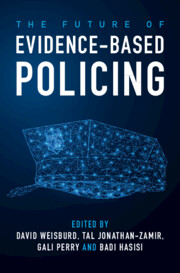Book contents
- The Future of Evidence-Based Policing
- The Future of Evidence-Based Policing
- Copyright page
- Contents
- Figures
- Tables
- Contributors
- Editors
- 1 The Future of Evidence-Based Policing
- Part I Taking Stock of Evidence-Based Policing
- Part II The Evidence for Evidence-Based Policing
- Part III Innovations in Tools of Evaluation and Assessment
- Part IV Challenges to the Implementation of Evidence-Based Policing
- 10 Practitioners’ Inclination to Rely on Experience
- 11 Implementing Evidence-Based Policing
- 12 Towards Implementing Evidence-Based Policing
- 13 Evidence-Based Policing and the Law
- Part V The Practitioner’s Perspective
- 17 Conclusions
- Index
- References
12 - Towards Implementing Evidence-Based Policing
Challenges in Latin America and Caribbean
from Part IV - Challenges to the Implementation of Evidence-Based Policing
Published online by Cambridge University Press: 01 June 2023
- The Future of Evidence-Based Policing
- The Future of Evidence-Based Policing
- Copyright page
- Contents
- Figures
- Tables
- Contributors
- Editors
- 1 The Future of Evidence-Based Policing
- Part I Taking Stock of Evidence-Based Policing
- Part II The Evidence for Evidence-Based Policing
- Part III Innovations in Tools of Evaluation and Assessment
- Part IV Challenges to the Implementation of Evidence-Based Policing
- 10 Practitioners’ Inclination to Rely on Experience
- 11 Implementing Evidence-Based Policing
- 12 Towards Implementing Evidence-Based Policing
- 13 Evidence-Based Policing and the Law
- Part V The Practitioner’s Perspective
- 17 Conclusions
- Index
- References
Summary
Latin America and the Caribbean is the most violent region on earth. However, implementation of evidence-based policing (EBP) lags due to institutional, cultural, political, and skills barriers. This chapter analyzes the context in which EBP is implemented and the challenges encountered and identifies actions to further promote EBP in the region. Challenges to adopt EBP include those present in advanced countries such as the need to institutionalize EBP and to build academic-practitioner partnerships, and also some challenges more prominent in the region including lack of reliable data, instability of political institutions and lack of trust in the police
Keywords
Information
- Type
- Chapter
- Information
- The Future of Evidence-Based Policing , pp. 235 - 251Publisher: Cambridge University PressPrint publication year: 2023
References
Accessibility standard: Unknown
Why this information is here
This section outlines the accessibility features of this content - including support for screen readers, full keyboard navigation and high-contrast display options. This may not be relevant for you.Accessibility Information
- 1
- Cited by
